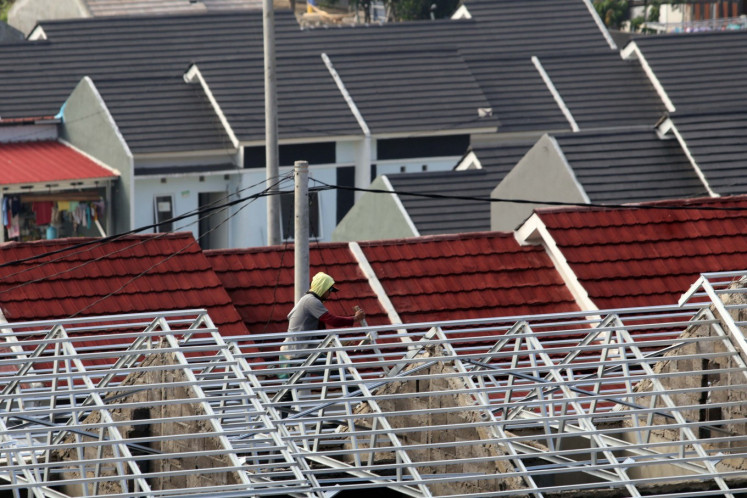Popular Reads
Top Results
Can't find what you're looking for?
View all search resultsPopular Reads
Top Results
Can't find what you're looking for?
View all search resultsWomen, children endure the ordeal four years on
"This life is no different from the flow of water
Change text size
Gift Premium Articles
to Anyone
"This life is no different from the flow of water. It comes and goes in turn. Sometimes it's clear and sometimes it's muddy."
These quotations are part of a chapter named "Breathing in the mud" from book Titanic Made by Lapindo written by Maksum Zuber.
"Breathing in the mud" tells of a story about women resorting to prostitution after the Lapindo mudflow swept away their homes.
The story describes the suffering women have endured as a consequence of the disaster, which first took place on May 29, 2006.
Ratih, not her real name, goes to her brothel when thousands of factory workers rush home. She has become a sex worker after the furniture company she was employed at became immersed in mud.
"I cannot do anything else to support my family. My husband is depressed because he has lost his job, while our debt keeps increasing," she said.
Ratih, her husband and their two children are now renting at a plot of houses, 10 kilometers from the mudflow site. They have lived on compensation money from Lapindo Brantas Inc., blamed for the mudflow disaster, but the next two months they will have to turn elsewhere for cash resources to pay for the rented house.
They have spent Lapindo money on paying debts and medical costs for the husband. The firm was declared not guilty by the Supreme Court.
"Whatever the sum, it cannot buy me back my dignity ... I have no other options to ensure my children are provided with as many opportunities as possible," she said.
Ratih is not the only woman who has resorted to prostitution for survival after the mudflow disaster occurred.
Another victim, Lilik Kamina, said women and children had taken the brunt of suffering from the disaster. She said many women had to earn money as their spouses lost jobs.
"We are experiencing a dilemma. Working in the sex industry is truly against religious teachings, while the urgency of household needs cannot be negotiated. We do not want to watch our children become street beggars." Lilik said people were wrongly assuming that compensation money was enough, which, had further agitated the condition with tenants charging mudflow victims more for rent.
"Media reports say mudflow victims have lost their jobs and have become rich from the money provided by Lapindo." she said.
Daniel Stefanus, a counselor to victims, said the government and Lapindo should provide women with better water for their reproduction needs.
"Thousands of women are still living around the mudflow site with bad sanitation; there is a lack of clean water for pregnant or menstruating women," he said.
A team designated to analyze the residential worthiness said in 2008 the water from wells was not healthy to consume because it was polluted with chloride, sulphate, natrium, magnesium and calcium.
Legal expert Soetandyo Wig-njosoebroto criticized the government's handling of the mudflow disaster.
"The children not only risk being unable to continue studies, but may also lose their social lives with schoolmates and fellow children in the neighborhood," he said.










